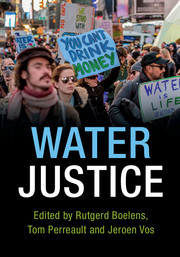Book contents
- Water Justice
- Reviews
- Water Justice
- Copyright page
- Contents
- Contributors
- 1 Introduction: The Multiple Challenges and Layers of Water Justice Struggles
- Part I Re-Politicizing Water Allocation
- Introduction: Re-Politicizing Water Allocation
- 2 Water Governance as a Question of Justice
- 3 Water Grabbing: Practices of Contestation and Appropriation of Water Resources in the Context of Expanding Global Capital
- 4 De-Politicized Policy Analysis: How the Prevailing Frameworks of Analysis Slight Equity in Water Governance
- 5 Urban Water and Sanitation Injustice
- Part II Hydrosocial De-Patterning and Re-Composition
- Part III Exclusion and Struggles for Co-Decision
- Part IV Governmentality, Discourses and Struggles over Imaginaries and Water Knowledge
- Index
- References
4 - De-Politicized Policy Analysis: How the Prevailing Frameworks of Analysis Slight Equity in Water Governance
from Part I - Re-Politicizing Water Allocation
Published online by Cambridge University Press: 26 February 2018
- Water Justice
- Reviews
- Water Justice
- Copyright page
- Contents
- Contributors
- 1 Introduction: The Multiple Challenges and Layers of Water Justice Struggles
- Part I Re-Politicizing Water Allocation
- Introduction: Re-Politicizing Water Allocation
- 2 Water Governance as a Question of Justice
- 3 Water Grabbing: Practices of Contestation and Appropriation of Water Resources in the Context of Expanding Global Capital
- 4 De-Politicized Policy Analysis: How the Prevailing Frameworks of Analysis Slight Equity in Water Governance
- 5 Urban Water and Sanitation Injustice
- Part II Hydrosocial De-Patterning and Re-Composition
- Part III Exclusion and Struggles for Co-Decision
- Part IV Governmentality, Discourses and Struggles over Imaginaries and Water Knowledge
- Index
- References
Summary
- Type
- Chapter
- Information
- Water Justice , pp. 71 - 88Publisher: Cambridge University PressPrint publication year: 2018



